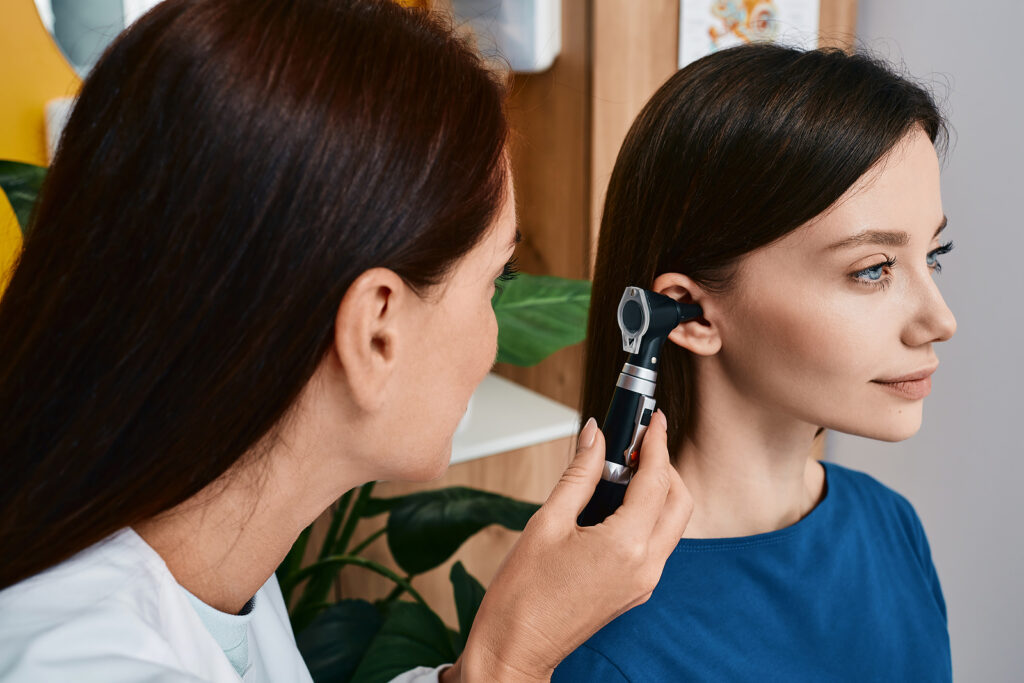The American Speech-Language-Hearing Association (ASHA) defines acquired hearing loss as hearing loss after birth. Anyone can get sick or hurt and lose their hearing at any time in their lives.
Congenital hearing loss is caused by genes and happens at conception. Acquired hearing loss, on the other hand, has many external causes. Here, we look at the different things that can cause hearing loss over time.
Presbycusis (Age-Related Hearing Loss)
Age-related hearing loss, also called presbycusis, is one of the most common types of hearing loss caused by something else.
Our inner ear hair cells naturally die off as we get older (maybe because we’ve been around noises all our lives). The hair cells in the inner ear are in charge of turning sound vibrations into neural signals that the brain can interpret as sound. These cells don’t come back to life after they die. This causes sensorineural hearing loss as a result. Sensorineural hearing loss can be caused by presbycusis.
Noise-induced Hearing Loss
The other common type of sensorineural hearing loss is hearing loss caused by noise. Noise-induced hearing loss can be caused by being around loud sounds, either for a short time or for a long time.
To give you an idea of how loud this is, the average conversation is 65 decibels. A jet engine at takeoff is about 120 decibels loud. At 120 decibels, your hearing could be damaged for life. Hearing experts say the damage could be permanent after an hour of exposure to sound louder than 85 decibels.
Noise-induced hearing loss, on the other hand, is 100% preventable if you take the proper steps to protect your ears. Noise-induced hearing loss could be avoided by wearing earplugs or hearing protection made just for you when you are around loud sounds, whether at work or in your free time.
Some prescription drugs
“Ototoxic” means that something is “poisonous to the ear.”
At least 100 classes of drugs have been found to cause ototoxicity. These include aspirin and quinine, which are known to cause temporary ototoxicity and tinnitus, loop diuretics (also called “water pills”), whose ototoxicity is increased when used with aminoglycoside antibiotics, all aminoglycoside antibiotics (including streptomycin), and some cancer-fighting drugs like cisplatin and carboplatin.
Taking ototoxic drugs hurts the hair cells in the inner ear, which can cause sensorineural hearing loss. Ototoxic many medicines are expected and needed in a variety of medical situations. However, they are not known to be ototoxic until they have caused hearing loss in many patients.
Even so, drugs only cause hearing loss in a few cases. If your doctor has given you medicine, please keep doing what they tell you. If your hearing changes, tell your doctor about it the next time you see them.
Problems caused by certain illnesses or injuries
ASHA says that ear infections, meningitis, measles, encephalitis, chickenpox, the flu, mumps, and mumps could all lead to hearing loss. Also, head and neck injuries can sometimes make it hard to hear. Hearing loss could also be caused by tumors that press on the parts of the ear that help you hear.
Hearing health is also affected by how healthy and happy a person is. People who work out regularly, don’t smoke or drink too much, and eat well are less likely to lose their hearing.
What you can do about hearing loss caused by age
Hearing loss is a condition that can’t be seen, which makes it hard to notice at first. So, it’s essential to watch for the signs of hearing loss.
Let’s say you have trouble understanding speech and often have to ask people to repeat themselves. If so, this could be a sign of hearing loss. If your TV and phone volume is turned up and you still have trouble hearing, you may have hearing loss.
Hearing loss happens slowly and usually over a long time. It affects people of all ages, but Americans over 65 are most likely to have it. Hearing experts say that starting at age 50, and you should get a hearing test every year to check on your hearing.
Reach out to us now! Get in touch with us to set up an appointment for a hearing test. If a hearing loss is found, we will help you find the best way to move forward and get back to your life.


